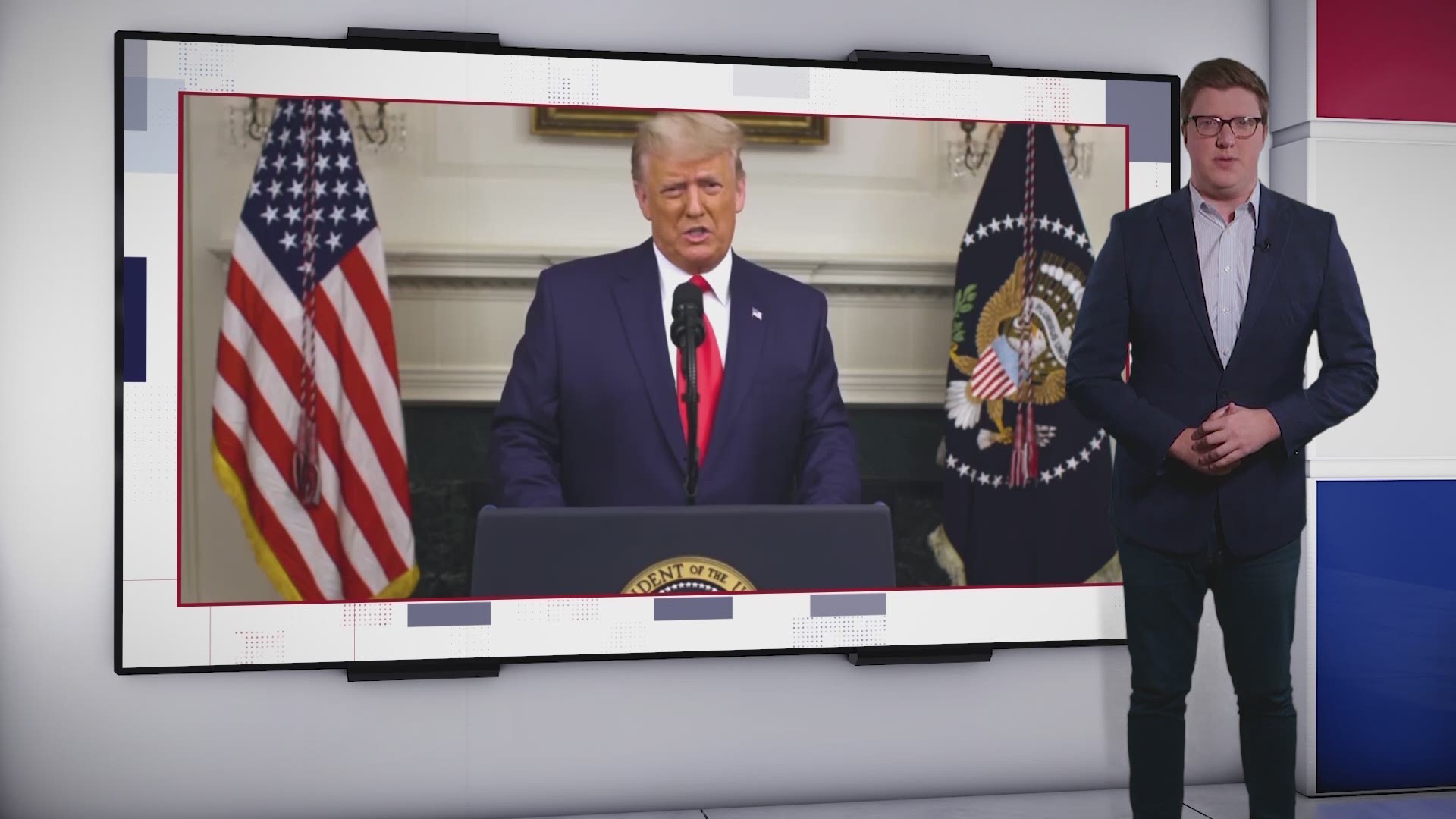President Donald Trump posted a 46-minute video to his social media channels Wednesday evening where he continued to challenge the results of the presidential election.
His speech was full of claims of election fraud in various states, many of which he’s made previously and have been fact-checked before.
Trump’s broader claim — that widespread election fraud has altered the outcome of the election — has been challenged by official sources.
The Cybersecurity and Infrastructure Security Agency (CISA), a federal agency established during the Trump administration, said, “The November 3rd election was the most secure in American history.” CISA director Chris Krebs was fired by Trump soon after because the president said the statement was incorrect.
The Associated Press reported Tuesday that "Attorney General William Barr declared the U.S. Justice Department has uncovered no evidence of widespread voter fraud that could change the outcome of the 2020 election.” Neither Barr nor the Justice Department have disputed the AP report.
The courts have not sided with Trump, either. Most of the legal challenges the president's team and their allies have pushed through the courts have either been dismissed, rejected or dropped.
Nonetheless, there are still several cases that are ongoing. At this time, there is no credible evidence released to the public that shows that election fraud affected the outcome of the election.
The VERIFY team has summarized some of their previous fact-checks on claims Trump made during his speech posted to social media Wednesday as well as some new claims:
“[Ballots] were sent to dead people by the thousands. In fact, dead people -- and we have many examples -- filled out ballots, made applications, and then voted. Which is even worse.”
There isn’t any credible evidence that dead people voted in the election by the thousands. In fact, a past VERIFY found much of the evidence used to prove dead people voted were errors that election officials addressed, such as crediting a living person’s vote to a dead person with a similar name.
States are required by federal law to update their voter rolls and remove dead people, and they have processes to do so. And sometimes, online voter lists will purposely list incorrect birthdays to hide identities or may list incorrect birthdays because of a human error. Voting under the identity of another person, including a deceased person, is a federal crime that would be under the purview of the Justice Department.
“I very easily win these swing states, just like I won them at 10 o'clock in the evening, the evening of the election.”
A past VERIFY found that states very rarely finish counting the ballots the night of the election, even in past elections. States have various deadlines for certifying their election results, accepting absentee ballots and beginning their absentee ballot counts. Thus, different states will vary on the speed of their vote counting because of this. It typically goes unnoticed because in most years, the votes counted later don’t significantly change the early results.
This year, however, there was more mail-in voting than usual. There was also a partisan lean as to who voted in-person and who voted by mail. Time zones matter, too. By 10:00 p.m. Eastern Time, as Trump mentioned, the polls hadn’t even closed in every state.
“And frankly, when you look at who's running the company, who's in charge, who owns it, which we don't know, where are the votes counted, which we think are counted in foreign countries, not in the United States.”
The second part of that claim has been covered in a previous VERIFY. We’ll cover that first. There’s no evidence votes are tallied outside the United States. Votes across the country are counted within the counties. A spokesperson for the National Association of Secretaries of State, an association of people who typically administer elections, said, “Elections in the United States of America are administered, run, counted and certified by state and local election officials. We have never heard of votes being tabulated in a foreign country.”
The first part of the claim is also false. The person who runs the company Trump is referencing, Dominion, is public knowledge. It's president and CEO is John Polous, and he testified before Congress about voting security in January. The U.S. Election Assistance Commission says Dominion Voting Systems Corporation is headquartered in Denver. The EAC lists many of its voting machines as certified voting equipment.
“In swing state after swing state, the number of ballots rejected has been dramatically lower than what would have been expected based on prior experience. That means years and years of voting. In Georgia, just 0.2%. That's substantially less than 1% of mail-in ballots have been rejected, in other words, almost none have been rejected. They took everything. Nothing was rejected, practically, compared to 6.4% in 2016, and there are those that think that 6.4% was a low number.”
Georgia’s Secretary of State Brad Raffensperger clarified on Facebook that the percentage of mail-in ballots rejected for signatures is about the same as it has been in past elections. He only included those ballots because counties are still counting the number of ballots rejected for coming in late and the state doesn’t have those numbers yet. Raffensperger said 0.24% were rejected for signatures in 2016, 0.15% were rejected for signatures in 2018, 0.28% were rejected for signatures during the 2020 primary, and 0.15% were rejected for signatures in the 2020 general. He also included the data for the latter three elections in a press release.
Raffensperger said the majority of rejected mail-in ballots are rejected because they miss the deadline, and so the true number of rejected mail-in ballots in Georgia will likely be much higher once all of its counties report back to the state.
Trump has made a similar claim in a tweet before, but at the time said Georgia rejected “close to 4%” of ballots.
Something you’d like VERIFIED? Click here to submit your story.

